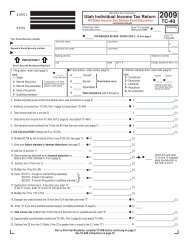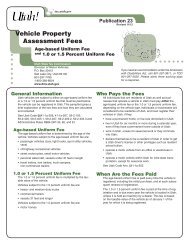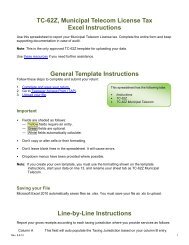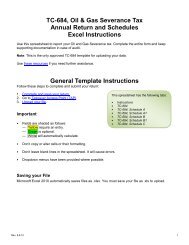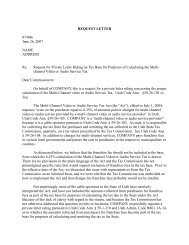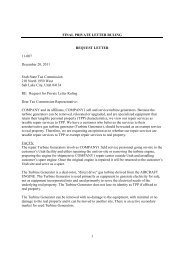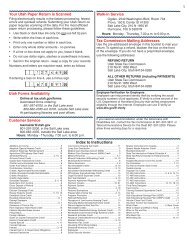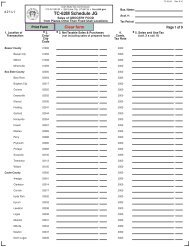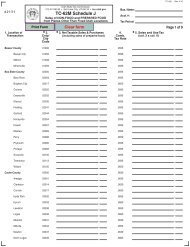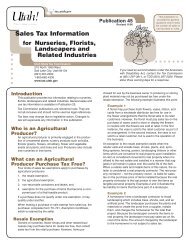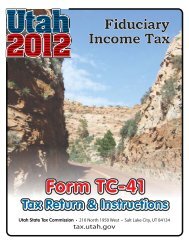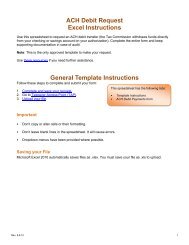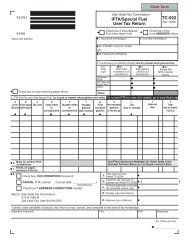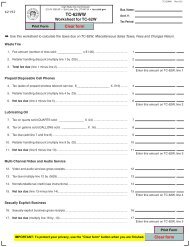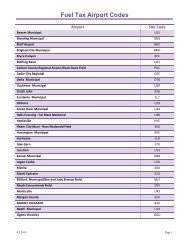Pub 25, Utah Sales and Use Tax General Information
Pub 25, Utah Sales and Use Tax General Information
Pub 25, Utah Sales and Use Tax General Information
You also want an ePaper? Increase the reach of your titles
YUMPU automatically turns print PDFs into web optimized ePapers that Google loves.
<strong>25</strong><br />
Filing <strong>and</strong> Reporting<br />
Requirements<br />
Accounting Methods<br />
Sellers must use accrual basis accounting to report sales<br />
<strong>and</strong> use tax (see exceptions below). Report all sales <strong>and</strong><br />
use tax on goods sold <strong>and</strong> consumed during a fi ling period<br />
on the return for that fi ling period (see Filing Frequency).<br />
You may only use cash basis reporting if one of the following<br />
circumstances applies:<br />
a sale includes delivery or installation of tangible personal<br />
property at a location OTHER than the seller’s place of<br />
business (the seller must state the delivery or installation<br />
on the invoice), or<br />
a buyer who converts tangible personal property into real<br />
property chooses to report use tax on a cash basis — only<br />
if the buyer is not required to pay use tax on a monthly<br />
basis.<br />
Returns<br />
Every sales <strong>and</strong> use tax account must fi le a <strong>Sales</strong> <strong>and</strong> <strong>Use</strong><br />
<strong>Tax</strong> Return for each fi ling period. Depending on the nature<br />
of your business, your return is either form TC-62S or form<br />
TC-62M. If you fi le TC-62M, you must also fi le schedules<br />
with your return (see Forms <strong>and</strong> Schedules, below).<br />
If you are liable for sales-related taxes (transient room, restaurant,<br />
motor vehicle rental, waste tire, etc.), you must fi le a<br />
separate return for each separate type of tax or fee.<br />
Only fi le once for each fi ling period.<br />
Returns are due the last day of the month following each<br />
fi ling period. When a due date falls on a weekend or legal<br />
holiday, the return is due the next business day.<br />
Paper Returns<br />
The <strong>Tax</strong> Commission mails personalized returns to every<br />
seller (unless a seller asks not to receive paper returns).<br />
However, you must fi le returns <strong>and</strong> pay taxes by the due<br />
date, even if you don’t receive a return. Get blank forms <strong>and</strong><br />
schedules online at tax.utah.gov/forms.<br />
Online <strong>Sales</strong> <strong>Tax</strong> Return<br />
You may fi le your <strong>Sales</strong> <strong>and</strong> <strong>Use</strong> <strong>Tax</strong> Returns <strong>and</strong> schedules<br />
online at taxexpress.utah.gov.<br />
Filing Frequency<br />
Your fi ling frequency depends on your yearly sales tax liability:<br />
If your sales tax liability is less than $1,000 per year, you<br />
may fi le annually.<br />
If your sales tax liability is between $1,000 <strong>and</strong> $50,000<br />
per year, you may fi le quarterly.<br />
If your sales tax liability is $50,000 or more, you must fi le<br />
monthly.<br />
The <strong>Tax</strong> Commission will set your fi ling frequency <strong>and</strong> notify<br />
you if it changes.<br />
You will fi le the following at the same time you fi le your sales<br />
tax return:<br />
Municipal energy sales <strong>and</strong> use tax<br />
Municipal telecom license tax<br />
Lubricating oil recycling fee<br />
Waste tire recycling fee<br />
Multi-channel video <strong>and</strong> audio service tax<br />
911 emergency telecom service fee<br />
Emergency services poison control fee<br />
Statewide unifi ed 911 fee<br />
Disposable cell phone fee<br />
Forms <strong>and</strong> Schedules<br />
What to File<br />
TC-62S, <strong>Sales</strong> <strong>and</strong> <strong>Use</strong> <strong>Tax</strong> Return, Single Place of Business<br />
— For sellers with one fi xed <strong>Utah</strong> location. TC-62S<br />
fi lers do not need to fi le schedules.<br />
TC-62M, <strong>Sales</strong> <strong>and</strong> <strong>Use</strong> <strong>Tax</strong> Return, Multiple Places of Business<br />
— For sellers with multiple <strong>Utah</strong> business locations or no fi xed<br />
place of business. Sellers fi le TC-62M if they need to report:<br />
vending machine sales with multiple inventory locations,<br />
sales in <strong>Utah</strong> from a non-fi xed place of business,<br />
sales exempt from the resort tax in a resort community,<br />
sales of tangible personal property or products transferred<br />
electronically that are sent into <strong>Utah</strong> by sellers with <strong>Utah</strong> nexus.<br />
TC-62M fi lers must also fi le one or more of the following<br />
schedules:<br />
Schedule A, for sales of non-food <strong>and</strong> prepared food from<br />
multiple fi xed business locations, based on the seller’s location.<br />
Schedule AG, for sales of grocery food from multiple fi xed<br />
business locations, based on the seller’s location.<br />
Schedule J, for sales of non-food <strong>and</strong> prepared food reported<br />
based on the customer’s location, or consumption<br />
of tangible personal property or products transferred electronically<br />
at a location other than a fi xed place of business.<br />
Schedule JG for sales of grocery food reported based on<br />
the customer’s location.<br />
Schedule X for sales exempt from resort communities tax.<br />
Seller Discount<br />
Monthly sales tax fi lers may take a seller discount equal to<br />
1.31 percent of the combined sales tax. Monthly tourism tax<br />
fi lers may take a seller discount equal to 1 percent of the<br />
tourism short-term leasing tax adopted by the county. Sellers<br />
of grocery food may take the seller discount of 1.31 percent<br />
as if they had collected tax at the full combined rate. Quarterly<br />
<strong>and</strong> annual fi lers may not take the seller discount.<br />
Goods Consumed by the Seller<br />
Items consumed by the seller are subject to use tax on the<br />
amount of the seller’s cost, not the potential sales price.<br />
Items consumed by the seller include:<br />
items taken from inventory <strong>and</strong> used by the seller,<br />
samples given away for advertising, <strong>and</strong><br />
products consumed by employees without payment.<br />
When you buy products from local businesses for storage or use,<br />
you must pay tax at the time of purchase. For example, offi ce<br />
supplies <strong>and</strong> equipment (such as cash register tapes, returnable<br />
containers <strong>and</strong> furniture) are taxable at the point of sale.<br />
A seller may purchase tax-free grocery bags, sacks <strong>and</strong><br />
other non-returnable packaging material that go out the door<br />
with the customer.<br />
page 12



